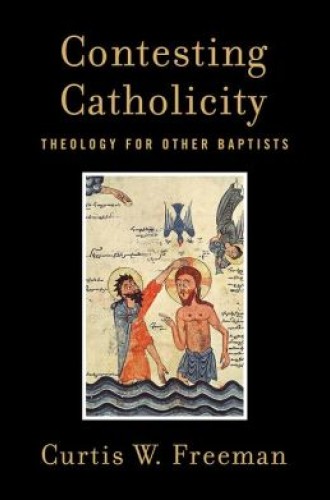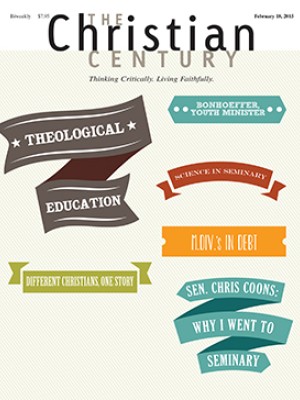Contesting Catholicity, by Curtis W. Freeman
Curtis Freeman has written an important and compelling study of the past and the future of Baptists. The director of the Baptist House of Studies at Duke Divinity School, Freeman combines detailed reflection on the history of Baptists with vigorous theological advocacy for catholicity.
The terms of his engagement are indicated in the title of his book: the phrase “other Baptists” refers to those Baptists who can no longer find an ecclesial home in the Southern Baptist Convention. The book is a reflective proposal for how other Baptists, who are everywhere visible in a variety of formal and informal associations, can take Baptist theology and tradition seriously without being hemmed in by sectarianism. Freeman contends that other Baptists can readily understand the catholic tradition of faith and situate themselves within it, but the Baptist heritage invites them to a posture of contestation in which they continue to question and dissent from some claims and practices of that catholic tradition.
Read our latest issue or browse back issues.
Thus Freeman’s book addresses primarily Baptists, but his concern matters to all Christians (including Roman Catholics) who live in denominational separatism but who are summoned to embrace the richness of catholic faith and tradition in a generous orthodoxy. The problem of alienation from the catholic tradition is not peculiar to Baptists. It is a common malady on the American ecclesial scene.
The book is organized into two unequal parts: “Sickness unto Death” traces the development of Baptist sectarianism into a kind of undisciplined liberalism in the United States; “Life That Really Is Life” contains a proposal for a Baptist embrace of catholic faith and tradition. Put simply, the two parts are a meditation on ecclesial death and a proposal for ecclesial life.
The pivot in the first, shorter part of the book is “alterity,” with a “pathological fear of the other” and what might become generous engagement with the other. At the outset Freeman contrasts John Winthrop’s refusal to “acknowledge the other of American Indians” with Roger Williams’s approach: the “Ur-Baptist of America” recognized the otherness of indigenous people and practiced hospitality toward them.
Freeman then traces the disputatious history of conservative Christians who relied on rationalism and liberal Christians who appealed to experience, which eventuated in the stalemate of fundamentalism versus liberalism. Given that history, Freeman contends that “other Baptists” must seek another way in generative orthodoxy that makes room for the other but does not compromise the primary claims of faith that bespeak a rich catholicity. He treats the move toward such generous orthodoxy with historical particularity, discussing the prophetic insistences of Carlyle Marney and the judicious formulations of James McClendon. In reference to the ecumenical creeds, Freeman writes: “Other Baptists move beyond fundamentalism and liberalism toward the bedrock of catholicity.”
The second, meaty part of the book is an exposition of catholicity with an eye toward how it matters to Baptists, how Baptists respond to it, and the contributions Baptists may make to its future. Freeman begins by appealing to the creeds and thus the trinitarian formulation that cannot be compromised. He observes:
Liberals seem inclined to find unitarianism of the First Person as more reasonable, while evangelicals appear prone to regard unitarianism of the Second Person as more relevant. One might conclude, then, that Baptists are unitarians that simply have not yet gotten around to denying the Trinity.
Freeman insists on a re-embrace of trinitarianism not as an esoteric formulation but as a living practice and a generative conviction. He reflects on the nature of the church and riffs on “soul competence,” which has led, in Baptist circles, to privatized piety. His insistence on a recovery of catholic ecclesiology requires a recognition of the communal character of the gathered community, which cannot be private, individualistic, or endlessly local but is a part of a universal community over time and space.
The final three chapters address, in turn, scripture, the Eucharist, and baptism. In his chapter on scripture, Freeman does not break new ground. He powerfully resists private, individualistic scripture interpretation and insists on responsible reading by the entire community. He affirms, not surprisingly, that “more light” is yet to come from scripture, and that view works against settled conclusions. In this probe Marney is his great model of openness.
In the chapter on the Eucharist, Freeman takes into account the Baptist reluctance to regard the Eucharist as sacrament—reluctance that reflects in part resistance to “magic” and in part a “Romophobic tendency.” He inveighs against a Baptist readiness to regard communion as “mere symbol” and insists that it is not only a symbol but an instrument that both tells the truth and conveys grace. In a reflection on the 16th-century dispute over “presence,” Freeman judges that even Zwingli in his final years “emerged as a reformed catholic theologian,” so that “there is a doctrine of real presence in Zwingli’s sacramental theology.” This exposition ends with an appeal to the most compelling liturgical formulae about communion, with a recognition that it is not formulation but practice that will be the way forward—a practice of real presence through powerful sign.
As we might expect, the chapter on baptism brings into play the cluster of acute questions concerning infant baptism, believer’s baptism, and immersion. Freeman notes that it is now widely recognized that believer’s baptism is normative from the earliest tradition and that other forms of baptism are an accommodation. He regards this as an important Baptist contribution to catholicity. At the same time, he allows that “other Baptists” will make room for infant baptism while resisting any requirement of rebaptism. He appeals to Warren Carr, who judged that “infant baptism plus confirmation equals believer’s baptism.” Freeman concludes: “Other Baptists are prepared to see infant baptism as a form of baptism derived from the norm of believer’s baptism, while only practicing the normative form in their own communities.” And this leads to a further judgment: “Other Baptists see themselves as a radically reforming community of contestation within the church catholic.” Such a stance precludes sectarianism and bespeaks ready engagement with the other.
Freeman’s exposition of catholicity is an important one that invites reflection across the ecumenical church. New thinking is required in a season of great bewilderment, when old practices and formulations are seen to be adequate.
Two reservations occur to me. First, Freeman very highly esteems verbal assent to confessional creedal formulations. He seems to assume that such assent is a guarantee of faithfulness. But twice he alludes to Miroslav Volf’s judgment that in his homeland of Croatia, Catholic identity was “inclined more to superstition than faith” and was embraced “more for nationalistic reasons.” Freeman surely knows that assent to creedal confessional formulae assures nothing, but he does not do much with that limitation. Much Baptist practice has been faithful even when such assent was absent. Saying “Lord, Lord” is not a sign of practical obedience.
My second wonderment is at the absence of any interest in a missional definition of the church. Although Freeman alludes to the World Council of Churches document “Baptism, Eucharist and Ministry” and allows that baptism is a “missional practice,” his presentation leaves catholicity as a reified claim that lives in a vacuum of suspension. I would have thought, in light of Vatican II, that missional engagement with socioeconomic issues belongs to the character of the church. Of course, Freeman might say that they were not his brief.
I hope that along with discussing the “truly catholic,” Freeman will turn his energy to the truly evangelical and truly reformed. There is much to ponder in this important book; but there is also more to do in articulating the claims of catholicity. In the meantime, the other Baptists I know are well along in being truly catholic, truly evangelical, and truly reformed.







